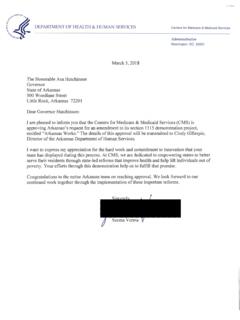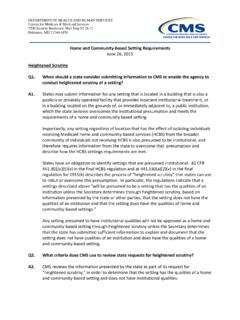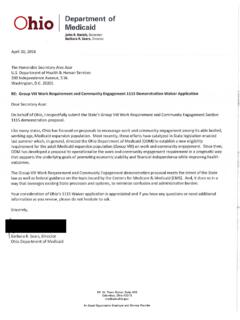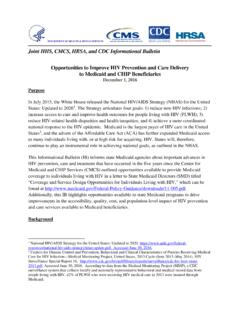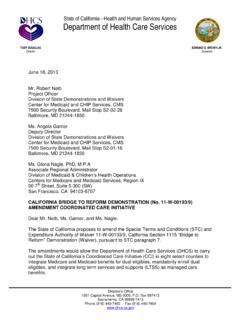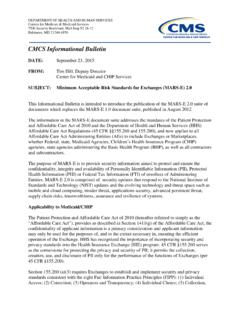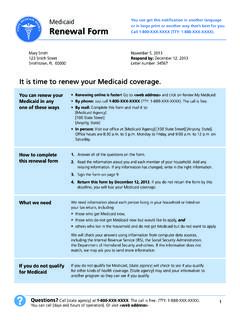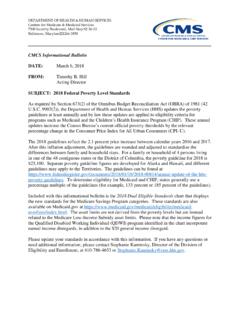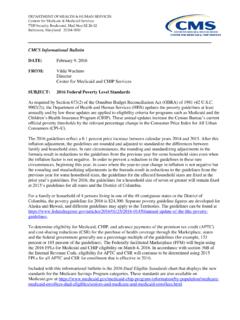Transcription of Managed Care in Florida - Medicaid.gov
1 Managed care in Florida This profile reflects state Managed care program information as of August 2014, and only includes information on active federal operating authorities, and as such, the program start date may not reflect the earliest date that a program enrolled beneficiaries and provided services. Some states report populations and services available to program participants under the federal authority ( Section 1115 waiver), so these features cannot be easily distinguished for each program. Overview of Current Managed care Programs In July 2012, about two thirds of medicaid beneficiaries were enrolled in some type of Managed care . About 70. percent of them were enrolled in a risk-based comprehensive Managed care organization, and 30 percent were enrolled in a primary care case management program called MediPass.
2 Since 2006, low-income children, pregnant women and parents, and aged and disabled individuals (with some exceptions) participated in a Managed care demonstration program called the Florida medicaid Pilot (formerly known as Florida medicaid Reform, operating under Section 1115 waiver authority). The state initially implemented the pilot in two counties in 2006 and then expanded to three more counties in 2007. In December 2011, the state expanded the pilot to operate in all counties and renamed the program Statewide medicaid Managed care (SMMC). Participants can choose between a capitated Managed care organization or alternative provider-sponsored networks. The plans cover all mandatory acute, primary and specialty services, and before 2011 could offer customized benefit packages and reduced cost sharing; flexibility in benefits plans became more restricted after 2011.
3 Dental services are covered through subcontracted dental plans. Enrollment is mandatory for most populations receiving full medicaid benefits, including aged adults, disabled adults and children, low income adults and children, full dual eligibles, and children in foster care . Currently, individuals with long term care needs that qualify for an institutional level of care receive services from two separate programs: acute and primary care services are provided through an SMMC plan, and long term services and supports are covered by HMOs and Provider Service Networks (PSN) participating in the Long-term care Managed care Program (also known as Nursing Home Diversion, operating under the authority of combined 1915(b)(c).)
4 Waivers). Dual eligibles may voluntarily enroll in MCOs for medicaid -covered benefits. In June 2013, the federal government approved the state's request to move nearly all medicaid beneficiaries and services into Managed care , starting in 2014 on a phased-in schedule. The new program has two separate components that will make Managed care enrollment mandatory on a statewide basis. The first component is the Long-Term care Managed care program, which expands the Managed Long-Term Services and Supports/Nursing Home Diversion program; mandatory enrollment was phased in statewide. The first of eight regions enrolled on August 1, 2013 and the final region enrollment occurred on March 1, 2014.
5 The second component of the new program is the Managed Medical Assistance program, which expanded the five-county pilot program to state-wide Managed care . The Managed Medical Assistance program provides comprehensive medicaid services to beneficiaries. The only groups who remain exempt from Managed care enrollment will be women eligible only for family planning services, women eligible through the breast and cervical cancer services program, people who are eligible for emergency medicaid for aliens, and children receiving services in a prescribed pediatric extended care center. The first phase of the Managed Medical Assistance program was implemented on May 1, 2014 and the final phase of the program was implemented on August 1, 2014.
6 The state's primary care case management program, called medicaid Provider Access System, or MediPass, has been in operation since 1990 and was expanded statewide in 1996. Approximately 5,000 MediPass primary care providers served about 600,000 beneficiaries, and the state contracted with a separate set of entities to provide disease management services to MediPass members living with chronic illnesses. MediPass enrollees in certain counties obtain behavioral health services through two pre-paid mental health plans ( Florida Health Partnership or Access Behavioral Health). Effective July 2013, most medicaid children will be enrolled in one of two prepaid dental health plans (DentaQuest or MCNA Dental), with the exception of children enrolled in medicaid Managed care plans offering optional dental services.
7 Effective August 2014, beneficiaries enrolled in MediPass transitioned to the Managed Medical Assistance program. The state is seeking to establish a new health care delivery system for Medically Needy individuals (those who qualify for medicaid because their income is reduced to qualifying levels due to high medical bills). If approved, these individuals will be enrolled in one statewide Provider Service Network. All Medically Needy recipients will be required to enroll in a Managed care plan, as discussed above with the implementation of the Managed Medical Assistance program. Participating Plans, Plan Selection, and Rate Setting As of 2011, the state contracted with two dozen MCOs, most of which were for-profit and affiliated with national insurance carriers, to provide services under its two risk-based programs.
8 The state contracted with 17 plans in the Nursing Home Diversion program, but this number is expected to drop to seven plans under the Statewide medicaid Managed care (SMMC) Long-term care (LTC) program, including American Elder care , Amerigroup, Coventry, Humana, Molina, Sunshine, and United. Under the terms of the Section 1115 waiver, MCOs must meet a medical loss ratio standard, which requires them to spend at least 85% of total premiums received on activities directly related to the provision of care . The Managed Long-Term Services and Supports program (Nursing Home Diversion program). sets capitation payment rates by using utilization data drawn from plan-reported encounter reports, with adjustments for inflation and other factors required by the legislature.
9 There are currently 14 standard, non-specialty MCOs and 5 specialty health plans participating in the statewide Managed Medical Assistance program. The specialty health plans provide services related to HIV/AIDS, child welfare and foster care , severe mental illness, and dual eligible with chronic conditions. Quality and Performance Incentives Florida requires participating MCOs to be accredited by NCQA or another nationally recognized accrediting body, and to report to the state HEDIS and CAHPS measures as well as information on dental care utilization. If MCOs do not meet minimum performance targets (75th percentile), the state may require the MCO to submit a performance measure action plan (PMAP) and may apply monetary sanctions to MCOs that do not submit acceptable PMAPs.
10 As part of the achieved savings rebate process , MCOs that exceed state-defined quality measures may retain an additional one percent (1%) of revenue. The state may offer other incentives to all high-performing Managed care plans or award them on a competitive basis. Other incentives include quality designations, quality awards, and preferential auto-assignments. Under the terms of the new Section 1115 waiver, the state must create and make publicly available annual health plan report cards based on performance data from each health plan, and must measure the performance of subcontracted dental plans . Table: Managed care Program Features, as of August 2014. Long-Term care Program for the All- FL Coordinated Non- Program Medical Managed Managed care Inclusive care for the Emergency Name Assistance Program Program Elderly (PACE) Transportation Program MCO LTC MCO PACE Transportation PAHP.
